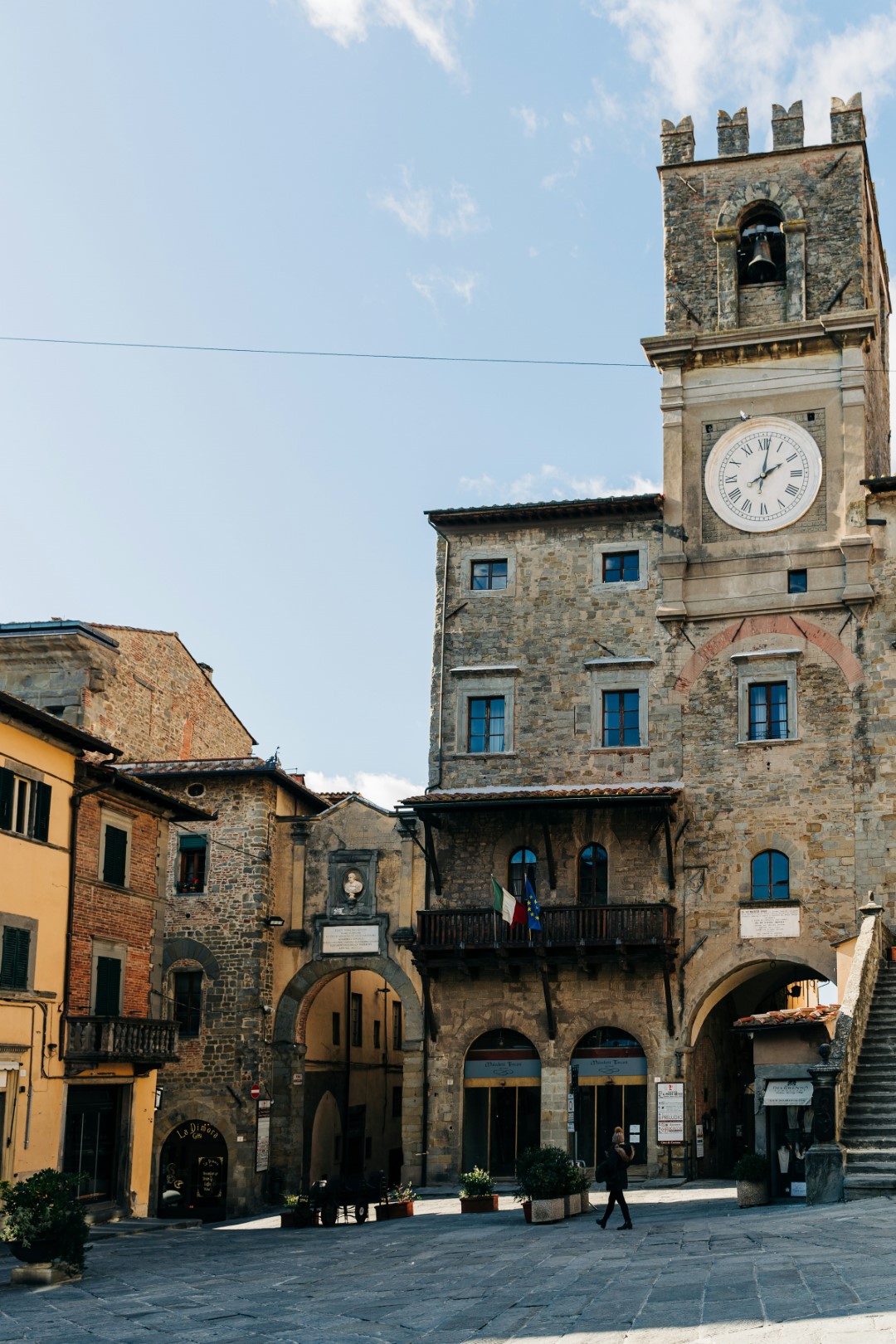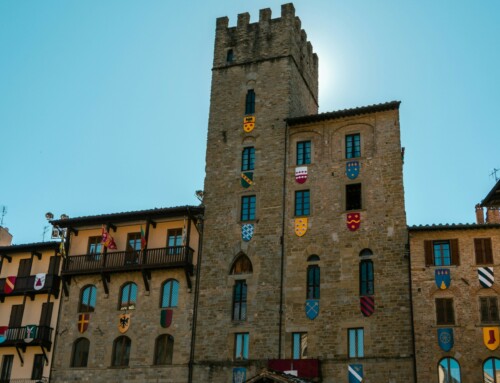The Beauty of Cortona

Cortona, nestled among the Tuscan hills, is a city rich in history, from Etruscan times through the Renaissance to the modern era. Its origins, witnessed by ancient walls and Etruscan tombs, blend with the heritage left by artists such as Luca Signorelli and Beato Angelico. Its location, close to Umbria, enriches the city with a dual cultural and scenic identity, making it a bridge between two regions rich in history, tradition and natural beauty. Today, Cortona attracts for its museums, churches rich in sacred art and archaeological sites that tell of the Etruscan and Roman past. The B&B Country House Poggio del Drago, located a short distance away, offers ideal hospitality for exploring this unique city, allowing guests to immerse themselves in cultural events, local gastronomy and traditions, making Cortona a must-see destination for those seeking an authentic Tuscan experience.
The City of Cortona and its millennial beauty
The City of Cortona, nestled in the green Tuscan hills, is a city with a millennial history, a witness to successive civilizations and cultures that have left an indelible mark on its urban and social fabric. Its origin dates back to the time of the Etruscans, an enigmatic and refined people who chose this strategic location for its dominant position, making it one of the twelve lucumonies of their confederation. Etruscan Cortona, or “Curtun,” as it is referred to in ancient inscriptions, emerged as a center of power and spirituality, as evidenced by the imposing walls that still encircle the city and the tumulus tombs that dot the surrounding landscape.
Much later, with the Renaissance, a new era of splendor dawned for Cortona, thanks to the presence of the likes of Luca Signorelli and Beato Angelico, who left an indelible imprint on the city’s artistic heritage. Florentine hegemony first and the influence of the Medici later led to a new phase of urban and cultural development, culminating in the construction of the Girifalco fortress, a symbol of Cortona’s strategic military importance.
Over the centuries Cortona has been able to preserve its identity, enriching itself with influences and contributing to Italian history and culture. Its resilience and ability to renew itself, while maintaining firm ties with the past, make Cortona a unique city, capable of fascinating and enchanting anyone who visits it, offering a vivid and authentic glimpse of an eternal and unchanging Tuscany.
Unique location: between the Tuscan hills and the charm of Umbria
Cortona stands majestically, embraced by the hills of Tuscany and close to the border with Umbria, in a position that gives it a unique landscape and cultural duality. This town, located south of the province of Arezzo, enjoys a panorama that stretches as far as Lake Trasimeno, offering vistas that look like paintings, where the deep green of nature blends with the blue of the sky and water. Its location, besides providing breathtaking views, has played a key role in its history, making it a crossroads of peoples, trade and cultural influences.
Its proximity to Umbria enriches Cortona with an additional layer of charm, creating a bridge between the two regions that share not only a landscape but also traditions, history and an artistic heritage of inestimable value. This geographic link allows visitors to easily explore the beauty of both regions, immersing themselves in a journey that spans time, from Etruscan evidence to Renaissance works to the hidden treasures of the medieval period and beyond.
Cortona’s location, then, is not just a geographical feature but becomes a distinctive element that has defined its cultural and historical identity. Being on the border between Tuscany and Umbria means living in a place where the past meets the present, where the richness of the artistic and historical heritage is combined with the beauty of a landscape that invites contemplation and discovery. This unique context makes Cortona an unmissable destination for those seeking an authentic experience, capable of combining art, history and nature in an unforgettable combination that leaves in the hearts of those who visit it the desire to return.
The fascinating history of Cortona
As we have already mentioned, Cortona is distinguished by a historical legacy rooted in Etruscan antiquity, evidenced by the imposing city walls and fascinating tombs, symbols of a civilization that left an indelible mark on the region. Among the most significant finds is the Tabula Cortonensis, a valuable document of the Etruscan language that helps unravel the mysteries of this enigmatic people. With the advent of Rome, Cortona was transformed, becoming integrated into the road and trade network of the Empire, while maintaining a prominent role due to its strategic location. This Roman past is still palpable in the paved roads and the remains of ancient villas that dot the territory, recalling the glorious legacy of ancient Corito.
An evolution that leaves one astounded
The evolution of the centuries saw Cortona go through the turbulence of the Middle Ages, emerging as a free municipality and the scene of heated struggles between Guelphs and Ghibellines, a period in which the city consolidated its autonomy and engaged in strategic alliances with neighboring power centers. The Renaissance marked an era of artistic and cultural revival for Cortona, thanks to the influence of figures such as Luca Signorelli and Beato Angelico, who enriched the town’s heritage with their works. Medici hegemony led to new urban developments, including the construction of the Girifalco fortress, which testified to Cortona’s military and strategic importance within Florentine policies.
Each era has helped shape Cortona’s identity, creating an urban fabric rich in history, art and culture. From Etruscan splendor to Renaissance mastery, via medieval vicissitudes, Cortona proves to be a stage on which the most diverse influences have succeeded one another, making it a unique place in the Tuscan landscape. Its ability to preserve and enhance this heritage, offering visitors a journey through the centuries, makes Cortona a must-see destination for those wishing to explore the deep roots of Italy and its civilization.
Main attractions of Cortona: museums, churches and archaeological sites
Cortona, in its contemporary essence, continues to be a crossroads of history, art and culture, offering its visitors a wide range of attractions that narrate the rich past of the city and the region. At the center of this cultural heritage are its museums, such as the Museum of the Etruscan Academy and the City of Cortona, where one can admire the famous Tabula Cortonensis, as well as a collection that ranges from Etruscan to Roman artifacts to Renaissance and Baroque works of art. This museum not only preserves but also tells the story of Cortona, offering visitors unique insights into the daily life of the civilizations that inhabited these lands.
Churches and Basilicas of Cortona
Cortona’s churches, then, are emblems of a spirituality and art that come together in buildings of extraordinary beauty. The Basilica of Santa Margherita, located high above the town, offers not only a place of prayer but also a breathtaking view of the valley below. Likewise, the Cathedral of Cortona and the many churches scattered throughout the historic center, such as the Church of San Francesco and the Church of Santa Maria Nuova, are must-see stops for those who wish to immerse themselves in the sacred art and religious architecture that characterized the Italian Middle Ages and Renaissance.
Cortona and Archaeology
No less important are the archaeological sites surrounding Cortona, witnesses to Etruscan and Roman antiquity. Among them, the Tumuli del Sodo offer a glimpse into Etruscan funerary practice, while the Roman paved roads take visitors on a journey through time, discovering the ancient communication routes that crossed these mountains. These sites not only enrich Cortona’s historical knowledge but also offer opportunities for outdoor exploration, combining cultural interest with the pleasure of nature and the Tuscan landscape.
Living Cortona: events, gastronomy and hospitality in the B&B Country House Poggio del Drago
Cortona is not only an open-air museum, but also a lively center of culture in which ancient traditions blend with the hospitality and warmth typical of Tuscany. The town and its surroundings offer a rich calendar of cultural events, food festivals and fairs celebrating the best of local produce, from traditional cuisine to fine wines, allowing visitors to fully immerse themselves in Cortonese life and traditions.
In this context, the B&B Country House Poggio del Drago is the ideal base for exploring Cortona and its wonders. Located a short distance from the city, this charming bed and breakfast offers not only a warm and familiar welcome but also a privileged location that allows guests to enjoy the serenity of the Tuscan countryside while being within walking distance of Cortona’s historical and cultural treasures. From its rooms, guests can admire the Tuscan landscape stretching to the borders of Umbria, starting each day with a view that is a true invitation to discovery.
Just a few kilometers from Poggio del Drago
The proximity of B&B Country House Poggio del Drago to Cortona allows guests to easily participate in the events that enliven the town throughout the year, from contemporary art exhibitions to historical re-enactments that bring the medieval and Renaissance atmosphere back to life. After a day spent in the streets of Cortona, immersed in its millenary history, guests can retire to the comfort and tranquility of the B&B, where hospitality is designed to make every stay an unforgettable experience.
The B&B Country House Poggio del Drago is also the perfect starting point for gastronomic explorations, offering guests the chance to discover the authentic flavors of Tuscan cuisine, from traditional dishes made with local ingredients to wine tastings in the surrounding wineries. A passion for gastronomy is combined with a love of hospitality, making every meal a moment of conviviality and discovery.
Choosing B&B Country House Poggio del Drago as a retreat while visiting Cortona means embracing a travel experience that goes beyond mere tourist exploration, immersing yourself in a context where history, culture, nature and hospitality intertwine to offer unique and memorable moments.




